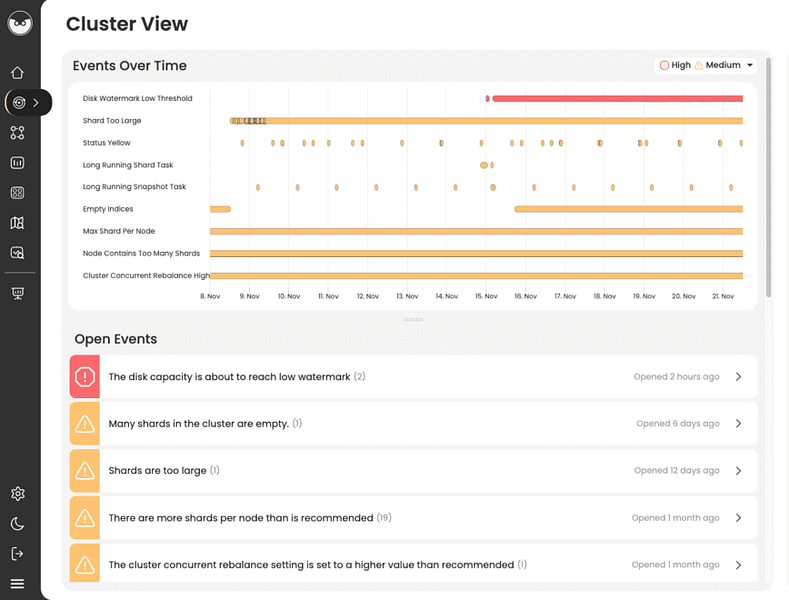Opster Team
Before you begin reading this guide, we recommend you run Elasticsearch Error Check-Up which analyzes 2 JSON files to detect many errors.
Briefly, this error occurs when the requested thread pool size for a specific operation in Elasticsearch is too large, and it is being set to the maximum size instead. To resolve this issue, you can try to reduce the requested thread pool
To easily locate the root cause and resolve this issue try AutoOps for Elasticsearch & OpenSearch. It diagnoses problems by analyzing hundreds of metrics collected by a lightweight agent and offers guidance for resolving them. Take a self-guided product tour to see for yourself (no registration required).
This guide will help you check for common problems that cause the log ” Requested thread pool size for is too large; setting to maximum instead ” to appear. To understand the issues related to this log, read the explanation below about the following Elasticsearch concepts: pool, thread and threadpool.
Overview
Elasticsearch uses threadpools to manage how requests are processed and to optimize the use of resources on each node in the cluster.
What it’s used for
The main threadpools are for search, get and write, but there are a number of others which you can see by running:
GET /_cat/thread_pool/?v&h=id,name,active,rejected,completed,size,type&pretty
You can see by running the above command that each node has a number of different thread pools, what the size and type of the thread pool are, and you can see which nodes have rejected operations. Elasticsearch automatically configures the threadpool management parameters based on the number of processors detected in each node.
Threadpool types
Fixed- a fixed number of threads, with a fixed queue size
thread_pool:
write:
size: 30
queue_size: 1000Scaling- a variable number of threads that Elasticsearch scales automatically according to workload.
thread_pool:
warmer:
core: 1
max: 8fixed_autoqueue_size- a fixed number of threads with a variable queue size which changes dynamically in order to maintain a target response time
thread_pool:
search:
size: 30
queue_size: 500
min_queue_size: 10
max_queue_size: 1000
auto_queue_frame_size: 2000
target_response_time: 1sExamples
To see which threads are using the highest CPU or taking the longest time you can use the following query. This may help find operations that are causing your cluster to underperform.
GET /_nodes/hot_threads
Notes and good things to know
In general it is not recommended to tweak threadpool settings. However, it is worth noting that the threadpools are set based upon the number of processors that Elasticsearch has detected on the underlying hardware. If that detection fails, then you should explicitly set the number of processors available in your hardware in elasticsearch.yml like this:
processors: 4
Most threadpools also have queues associated with them to enable Elasticsearch to store requests in memory while waiting for resources to become available to process the request. However the queues are usually of a finite size, and if that size becomes exceeded, then Elasticsearch will reject the request.
Sometimes you may be tempted to increase the queue size to prevent requests being rejected, but this will only treat the symptom and not the underlying cause of the problem. Indeed, it may even be counter productive, since by allowing a larger queue size, the node will need to use more memory to store the queue, and will have less space to actually manage requests. Furthermore increasing the queue size will also increase the length of time that operations are kept in the queue, resulting in client applications facing time out issues.
Usually, the only case where it can be justified to increase the queue size is where requests are received in uneven surges and you are unable to manage this process client-side.
You can monitor thread pools to better understand the performance of your Elasticsearch cluster. The Elasticsearch monitoring panel in Kibana shows your graphs of the search, get, and write thread queues and any queue rejections. Growing queues indicate that Elasticsearch is having difficulty keeping up with requests, and rejections indicate that queues have grown to the point that Elasticsearch rejects calls to the server.
Check the underlying causes of increases in queues. Try to balance activity across the nodes in the cluster and try to balance the demands on the cluster thread pool by taking actions on the client-side.
Log Context
Log “requested thread pool size [{}] for [{}] is too large; setting to maximum [{}] instead” classname is ThreadPool.java.
We extracted the following from Elasticsearch source code for those seeking an in-depth context :
if ((name.equals(Names.BULK) || name.equals(Names.INDEX)) && size > availableProcessors) {
// We use a hard max size for the indexing pools; because if too many threads enter Lucene's IndexWriter; it means
// too many segments written; too frequently; too much merging; etc:
// TODO: I would love to be loud here (throw an exception if you ask for a too-big size); but I think this is dangerous
// because on upgrade this setting could be in cluster state and hard for the user to correct?
logger.warn("requested thread pool size [{}] for [{}] is too large; setting to maximum [{}] instead";
size; name; availableProcessors);
size = availableProcessors;
}
return size;
Find & fix Elasticsearch problems
Opster AutoOps diagnoses & fixes issues in Elasticsearch based on analyzing hundreds of metrics.
Fix Your Cluster IssuesConnect in under 2 minutes

Billy McCarthy
Senior SysAdmin at Backblaze





